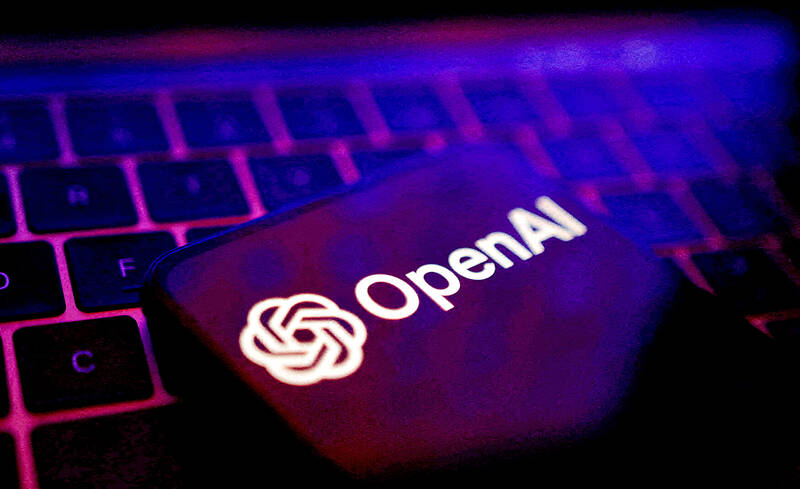OpenAI CEO Sam Altman and Nvidia Corp CEO Jensen Huang met with senior US administration officials and other industry leaders at the White House, where they discussed steps to address massive infrastructure needs for artificial intelligence (AI) projects.
Attendees included Anthropic CEO Dario Amodei, Google president Ruth Porat, Amazon.com Inc cloud chief Matt Garman and Microsoft Corp president Brad Smith, a White House statement on Thursday’s meeting said.
The government officials included US Secretary of Commerce Gina Raimondo, National Security Adviser Jake Sullivan and Secretary of Energy Jennifer Granholm.

Photo: Dado Ruvic, Reuters
Following the talks, the White House announced an interagency task force to help promote data center development in the US and initiatives to support accelerated permitting for those facilities. The steps are aimed at ensuring that the US retains its leadership in AI, where rapid advances require significant investments in data centers and energy supply.
The US Department of Energy would also steer data center owners and operators toward resources such as loans, grants and tax credits that can help them find clean and reliable power sources, the White House statement said.
OpenAI, for example, plans to spend tens of billions of US dollars on a domestic AI infrastructure push that spans data centers, energy capacity and transmission, and semiconductor manufacturing — with investment from around the globe. Company executives have been meeting with government officials for months about a range of issues related to the initiative, including national security concerns that could be associated with foreign capital.
The discussions took place the same day that OpenAI announced a new AI model known internally as “Strawberry” that can perform some human-like reasoning tasks, a step that signaled the intensity of the competition.
“OpenAI believes infrastructure is destiny and that building additional infrastructure in the US is critical to the country’s industrial policy and economic future,” OpenAI said on Thursday.
Porat said robust US energy infrastructure was crucial to ensuring US leadership in AI.
“Today’s White House convening was an important opportunity to advance the work required to modernize and expand the capacity of America’s energy grid,” she said.
The AI-fueled surge in US data center construction coincides with a broader manufacturing boost spurred by the Chips and Science Act and the Inflation Reduction Act — the signature subsidy programs for semiconductors and clean energy enacted in 2022 under US President Joe Biden.
Those investments, along with data center expansion and other factors, are expected to drive electricity demand up by 15 percent to 20 percent over the next decade, the US Department of Energy said.
Data centers could consume as much as 9 percent of US electricity generation annually by 2030, up from 4 percent of total load last year, an Electric Power Research Institute report said in May.
The Biden administration has said renewables such as wind and solar, as well as battery storage and energy efficiency gains, are some of the best ways to meet growing data center energy demand, because they are rapidly scalable and cost-competitive.

STEEP DECLINE: Yesterday’s drop was the third-steepest in its history, the steepest being Monday’s drop in the wake of the tariff announcement on Wednesday last week Taiwanese stocks continued their heavy sell-off yesterday, as concerns over US tariffs and unwinding of leveraged bets weighed on the market. The benchmark TAIEX plunged 1,068.19 points, or 5.79 percent, to 17,391.76, notching the biggest drop among Asian peers as it hit a 15-month low. The decline came even after the government on late Tuesday authorized the NT$500 billion (US$15.2 billion) National Stabilization Fund (國安基金) to step in to buoy the market amid investors’ worries over tariffs imposed by US President Donald Trump. Yesterday’s decline was the third-steepest in its history, trailing only the declines of 2,065.87 points on Monday and

TAKING STOCK: A Taiwanese cookware firm in Vietnam urged customers to assess inventory or place orders early so shipments can reach the US while tariffs are paused Taiwanese businesses in Vietnam are exploring alternatives after the White House imposed a 46 percent import duty on Vietnamese goods, following US President Donald Trump’s announcement of “reciprocal” tariffs on the US’ trading partners. Lo Shih-liang (羅世良), chairman of Brico Industry Co (裕茂工業), a Taiwanese company that manufactures cast iron cookware and stove components in Vietnam, said that more than 40 percent of his business was tied to the US market, describing the constant US policy shifts as an emotional roller coaster. “I work during the day and stay up all night watching the news. I’ve been following US news until 3am

Six years ago, LVMH’s billionaire CEO Bernard Arnault and US President Donald Trump cut the blue ribbon on a factory in rural Texas that would make designer handbags for Louis Vuitton, one of the world’s best-known luxury brands. However, since the high-profile opening, the factory has faced a host of problems limiting production, 11 former Louis Vuitton employees said. The site has consistently ranked among the worst-performing for Louis Vuitton globally, “significantly” underperforming other facilities, said three former Louis Vuitton workers and a senior industry source, who cited internal rankings shared with staff. The plant’s problems — which have not

TARIFF CONCERNS: The chipmaker cited global uncertainty from US tariffs and a weakening economic outlook, but said its Singapore expansion remains on track Vanguard International Semiconductor Corp (世界先進), a foundry service provider specializing in producing power management and display driver chips, yesterday withdrew its full-year revenue projection of moderate growth for this year, as escalating US tariff tensions raised uncertainty and concern about a potential economic recession. The Hsinchu-based chipmaker in February said revenues this year would grow mildly from last year based on improving supply chain inventory levels and market demand. At the time, it also anticipated gradual quarter revenue growth. However, the US’ sweeping tariff policy has upended the industry’s supply chains and weakened economic prospects for the world economy, it said. “Now